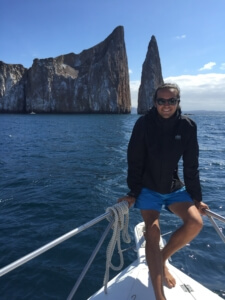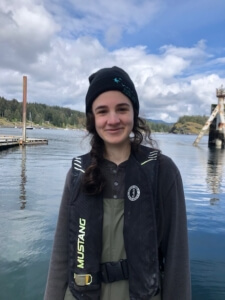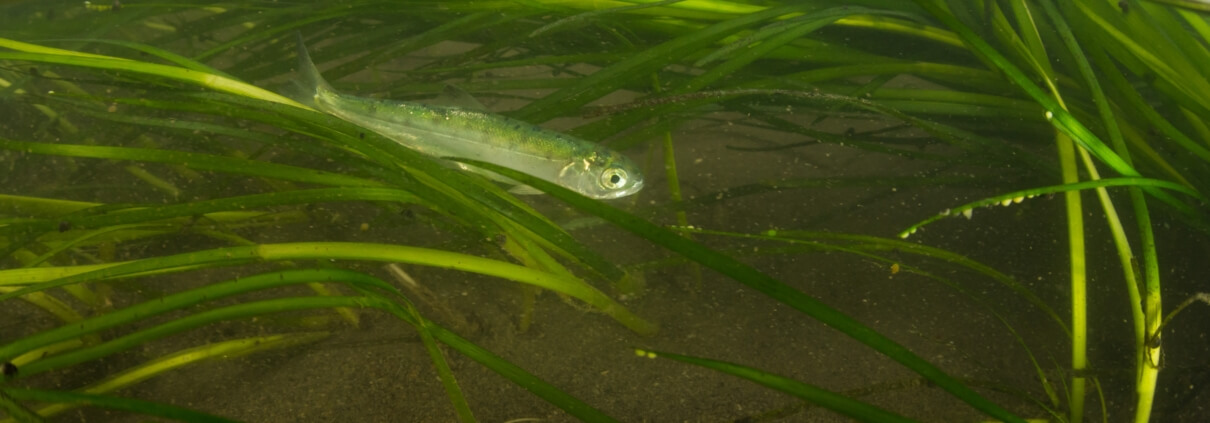Two UBC interns advance PSF’s climate change research
Two graduate students from the University of British Columbia – Alicia Andersen and Ian Chambers – joined the Pacific Salmon Foundation (PSF) during the summer of 2022 to complete internships with the Salmon Watersheds Program.
Chambers and Andersen worked on the program’s multi-year climate change project, which aims to assess the vulnerability of salmon populations throughout B.C. to changing conditions. The project involves identifying relevant climate indicators that reflect how freshwater and marine habitats are changing, determining each salmon population’s relative climate change vulnerability, and visualizing the results in the Pacific Salmon Explorer – an interactive tool for tracking and reporting the best-available data on the status of Pacific salmon and their habitats.
For their internships, Chambers and Anderson each conducted an applied research project and produced a report on their work. Learn more about their accomplishments with PSF and UBC below.
UBC Sustainability Scholar: Ian Chambers

Ian Chambers is completing his M.Sc. at UBC Okanagan in mathematical biology. Chambers’ thesis work on the invasive coddling moth employs mathematical models to help guide management efforts.
His research with PSF looked at how climate change is affecting the Fraser River estuary and the potential impacts on Pacific salmon. As part of his project, Chambers identified climate indicators and conducted data analyses to develop an understanding of they may affect salmon. His work will help PSF apply the climate indicator framework to other watersheds and regions.
Q&A with Ian Chambers
You’re currently studying mathematical biology. Why did you pursue that field of study?
I am passionate about conservation, so I originally intended to pursue biology; however, math has always been my strongest subject, so I took those courses to boost my GPA. Near the end of my undergraduate studies, I realized I was only a few courses away from fulfilling the requirements for a math major as well. I ended up double majoring in math and zoology, and in the final semester of my undergraduate studies, I took a mathematical biology course where I really became aware of the overlap between my two majors and learned how I could use my strengths in mathematics toward my passion for biology and conservation.
Can you name a highlight of your experience working on the Salmon Watershed Program’s climate change project?
I really enjoyed working with PSF because they are trying to find solutions to real-world problems. We know climate change is going to have some effect on salmon populations here in B.C., and PSF is being proactive in trying to identify how salmon populations will be affected, and then identify and implement management efforts to help the salmon. I enjoyed being part of a project that I felt was contributing to a solution and making a difference.
What was the most interesting thing you learned while working on your report on climate change indicators for Fraser River estuary salmon?
Coming from a background in zoology and mathematics, I wasn’t aware of the detail and complexity of the hydrological cycle. Learning more about the interconnectedness of many physical and chemical processes within the hydrological cycle was interesting for me, and learning about how this is all projected to change here in B.C. was eye-opening.
Read Chambers’ report on Fraser River estuary climate indicators here.
Chambers’ internship with the Salmon Watersheds Program was part of the UBC Sustainability Scholars Program, an innovative paid internship program that matches graduate students with partners to work on sustainability-driven projects.
UBC BRITE (Biodiversity Research: Integrative Training and Education) Intern: Alicia Andersen

Alicia Andersen is a M.Sc. student at the UBC Vancouver campus studying oceans and fisheries. Her research focuses on factors limiting the survival of juvenile sockeye salmon.
During her internship with PSF, Andersen developed an overview of marine climate indicators that may be useful for tracking and assessing the status of marine conditions relevant to salmon. PSF’s Salmon Watersheds Program intends to incorporate these indicators into the Pacific Salmon Explorer to better reflect the full suite of pressures salmon face across their life cycle.
Q&A with Alicia Andersen
Can you tell us more about your graduate studies?
I am working on completing a Master of Science in Oceans and Fisheries at the Institute for the Oceans and Fisheries at UBC. I am creating a framework for a vulnerability assessment for juvenile sockeye salmon during their marine outmigration through the Strait of Georgia, as well as determining if there is an association between environmental factors and condition metrics of salmon.
Can you name a highlight of your experience working on the Salmon Watershed Program (SWP)’s climate change project?
I really enjoyed working on the SWP’s climate change project because there were many parallels to my master’s research, particularly for determining environmental factors that impact salmon that can be incorporated into a vulnerability assessment, such as marine climate indicators. It was also interesting to sit in on discussions about the SWP’s vulnerability assessment framework, especially as the team is tackling including all salmon life stages, which will provide very valuable insights to the vulnerability of salmon populations. It will be very exciting to see the final product once the vulnerability assessment has been completed!
What was the most interesting thing you learned while working on your report on climate change indicators for Fraser River estuary salmon?
As the SWP’s climate change project encompasses all salmon populations in British Columbia, I really enjoyed gaining a better understanding of all the marine systems these populations interact with and how environmental conditions in different areas can have opposing effects on salmon survival. This differentiates from my master’s research which has a narrower focus on salmon migrating through the Strait of Georgia.
Read Andersen’s report on marine climate indicators for Pacific salmon here.
Andersen’s placement with the Salmon Watersheds Program was made possible by UBC’s BRITE (Biodiversity Research: Integrative Training and Education) internship program, which aims to create opportunities and widen skillsets for graduate students.



